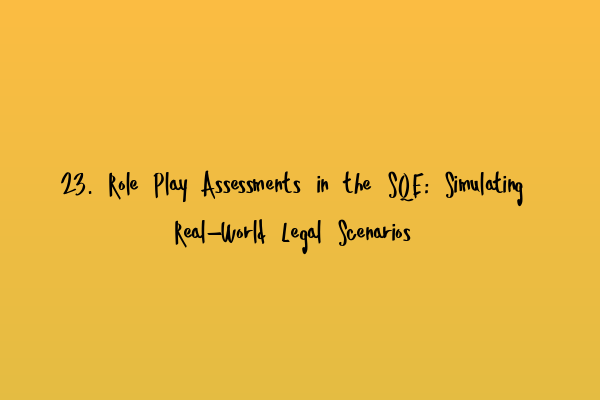Role Play Assessments in the SQE: Simulating Real-World Legal Scenarios
As the Solicitors Qualifying Exam (SQE) becomes the standardized assessment for solicitors in England and Wales, it is important for aspiring solicitors to understand and prepare for all aspects of the exam. One component of the SQE that requires specific attention is the role play assessments, which simulate real-world legal scenarios. In this article, we will explore the importance of role play assessments in the SQE, how they are structured, and provide tips on how to effectively prepare for these assessments.
What are Role Play Assessments?
Role play assessments in the SQE are designed to evaluate a candidate’s ability to apply legal knowledge and skills in practical situations. These assessments aim to replicate the challenges faced by solicitors in their everyday work, such as client interviews, negotiations, or advising clients on legal matters. By engaging in role play scenarios, candidates are required to demonstrate their legal thinking, problem-solving skills, communication abilities, and ethical judgment.
Role play assessments are conducted in a controlled environment with trained assessors who play the role of clients, colleagues, or opposing parties. Candidates are expected to analyze the legal issues presented in the scenario, ask relevant questions, provide appropriate advice, and effectively communicate their reasoning.
It is important to note that role play assessments are not about memorizing legal statutes and applying them mechanically. Instead, they focus on assessing a candidate’s ability to think on their feet, adapt to new information, and exercise professional judgment.
The Structure of Role Play Assessments
Role play assessments in the SQE consist of two parts: preparation and the role play itself. During the preparation phase, candidates are provided with background materials that outline the scenario, including the client’s instructions, relevant legal documents, and any additional information necessary to understand the context.
After a specified preparation time, candidates then participate in the role play assessment. The assessment may take place face-to-face or virtually, depending on the exam format. Candidates are expected to interact with the assessor playing the role of the client or other parties involved in the scenario.
The role play assessment may involve one or more tasks, such as conducting an initial client interview, negotiating a settlement, or advising a client on legal options. Candidates are assessed on their ability to identify legal issues, evaluate the relevant law, apply legal principles, and communicate effectively with the client or other parties.
Preparing for Role Play Assessments
Given the unique nature of role play assessments, it is essential to prepare adequately to perform well in the examination. Here are some tips to help you prepare effectively:
- Familiarize yourself with the assessment criteria: Review the SQE assessment framework to understand the specific skills and abilities that are assessed during role play assessments. This will help you focus your preparation on the areas that matter the most.
- Practice with mock role play scenarios: Engage in regular practice sessions with mock role play scenarios. This will help you build confidence, improve your legal analysis skills, and enhance your ability to communicate effectively under pressure.
- Seek feedback from experienced professionals: Collaborate with experienced professionals, such as qualified solicitors or legal trainers, who can provide constructive feedback on your performance. Their insights and advice can significantly enhance your preparation.
- Review relevant legal principles and procedures: Although role play assessments are not about memorizing legal statutes, it is important to have a solid understanding of core legal principles and procedures. Review key areas of law that are likely to be relevant to the scenarios presented in the assessment.
- Practice time management: Role play assessments are time-limited, and effective time management is crucial. Practice managing your time efficiently during practice sessions to ensure you can address all aspects of the scenario within the given time frame.
By following these preparation tips and dedicating sufficient time to practice, you can develop the necessary skills and confidence to excel in role play assessments during the SQE.
Final Thoughts
The role play assessments in the SQE are an integral part of evaluating a candidate’s ability to apply legal knowledge and skills in practical situations. By simulating real-world legal scenarios, these assessments provide a comprehensive assessment of a candidate’s legal thinking, problem-solving abilities, and ethical judgment.
To succeed in role play assessments, candidates must develop a deep understanding of the assessment criteria, regularly practice with mock scenarios, seek feedback from experienced professionals, review legal principles, and master time management skills.
For comprehensive preparation for the SQE, consider enrolling in quality courses and utilizing resources that focus specifically on role play assessments and other components of the exam. These resources will provide you with the necessary guidance and support to navigate the challenges of the SQE effectively.
Related Articles:
